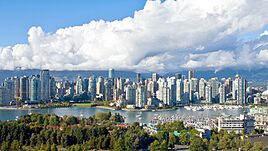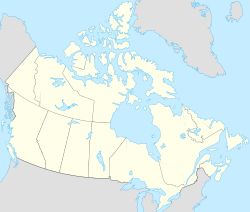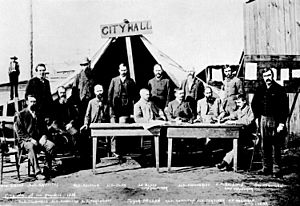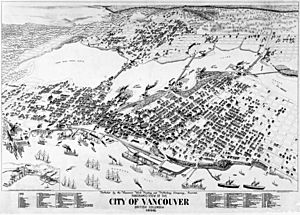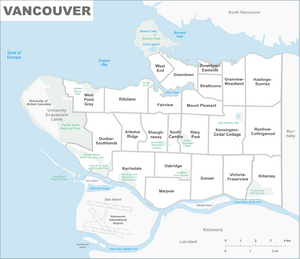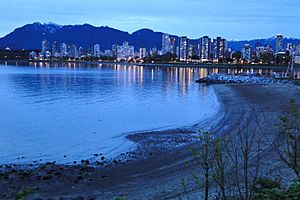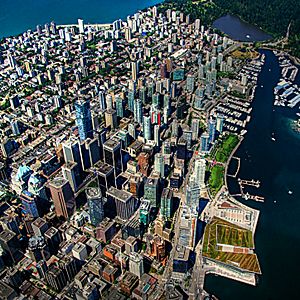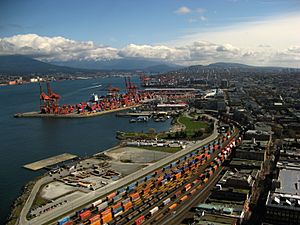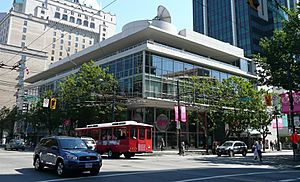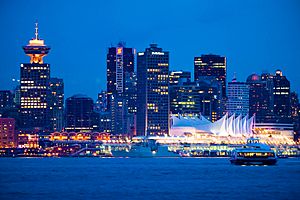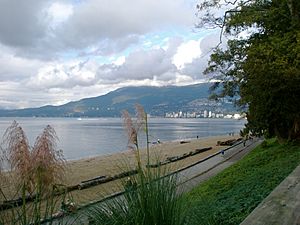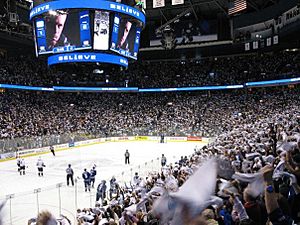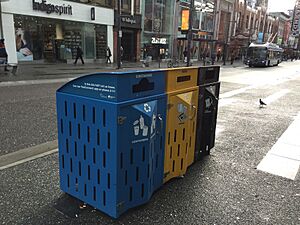Vancouver facts for kids
Quick facts for kids
Vancouver
|
|||||
|---|---|---|---|---|---|
|
City
|
|||||
| City of Vancouver | |||||
|
Downtown Vancouver skyline
|
|||||
|
|||||
| Nickname(s):
See nicknames of Vancouver
|
|||||
| Motto(s):
"By sea land and air we prosper"
|
|||||
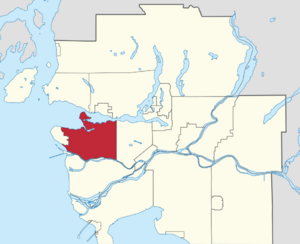
Location of Vancouver in Metro Vancouver
|
|||||
| Country | Canada | ||||
| Province | British Columbia | ||||
| Regional district | Metro Vancouver | ||||
| First settled | 6000–8000 BCE | ||||
| Established | March 10, 1870 (as Granville) | ||||
| Incorporated | April 6, 1886 (as Vancouver) | ||||
| Amalgamated | January 1, 1929 | ||||
| Named for | George Vancouver | ||||
| Seat | Vancouver City Hall | ||||
| Government | |||||
| • Type | Mayor-council government | ||||
| • Body | Vancouver City Council (11 members) | ||||
| Area | |||||
| • City | 123.63 km2 (47.73 sq mi) | ||||
| • Land | 115.18 km2 (44.47 sq mi) | ||||
| • Urban | 911.64 km2 (351.99 sq mi) | ||||
| • Metro | 2,878.93 km2 (1,111.56 sq mi) | ||||
| Highest elevation | 152 m (501 ft) | ||||
| Lowest elevation | 0 m (0 ft) | ||||
| Population
(2021)
|
|||||
| • City | 662,248 | ||||
| • Density | 5,749.9/km2 (14,892/sq mi) | ||||
| • Density rank | 1st in Canada | ||||
| • Metro | 2,642,825 (3rd in Canada) | ||||
| • Metro density | 918.0/km2 (2,378/sq mi) | ||||
| • Region | 3,049,496 | ||||
| Demonym(s) | Vancouverite | ||||
| Gross metropolitan product | |||||
| • Vancouver CMA | CA$183.14 billion (2021) | ||||
| Time zone | UTC−08:00 (PST) | ||||
| • Summer (DST) | UTC−07:00 (PDT) | ||||
| Forward sortation area |
V5K – V6T, V6Z, V7X – V7Y
|
||||
| Area codes | 604, 778, 236, 672 | ||||
| NTS map | 92G3 Lulu Island, 92G6 North Vancouver | ||||
| GNBC code | JBRIK | ||||
Vancouver is a big city in Western Canada, located in the Lower Mainland area of British Columbia. It's the most populated city in the province. In 2021, about 662,248 people lived in Vancouver. The larger Metro Vancouver area had 2.6 million people, making it the third-largest metropolitan area in Canada. Vancouver has the highest population density in Canada, meaning lots of people live close together.
Vancouver is known for being very diverse. Many people living here speak languages other than English. It's often ranked as one of the best cities to live in, both in Canada and worldwide. However, it's also one of the most expensive cities for housing. The city's unique way of planning its growth is called "Vancouverism."
Indigenous people lived in the Vancouver area for over 10,000 years. These groups include the Squamish, Musqueam, and Tsleil-Waututh peoples. The modern city started as a small settlement called Gastown in 1867. It was later renamed "Vancouver" in 1886. The Canadian Pacific Railway reached the city in 1887, making its large natural seaport important for trade between Asia, Europe, and Eastern Canada.
Vancouver has hosted many big events. These include the 1954 Commonwealth Games, Expo 86, and the 2010 Winter Olympics and Paralympics. The environmental group Greenpeace was started in Vancouver in 1969. Since 2014, the famous TED conferences have been held here.
The Port of Vancouver is Canada's busiest and largest port. While logging is still a big industry, tourism is the second largest. Vancouver is also a major centre for making movies and TV shows, earning it the nickname "Hollywood North".
Contents
What's in a Name?
The city is named after George Vancouver. He was an explorer who mapped the Burrard Inlet in 1792 and gave many places British names. The name "Vancouver" comes from the Dutch name "van Coevorden," which means someone from the city of Coevorden, Netherlands.
The Indigenous Squamish people called a village in this area K'emk'emeláy̓. This means "place of many maple trees." A sawmill was built here, which helped start the British settlement that became Vancouver.
Vancouver's Past
Early Days and First Peoples
Archaeological findings show that Aboriginal people lived in the Vancouver area between 8,000 and 10,000 years ago. The city is on the traditional lands of the Squamish, Musqueam, and Tseil-Waututh peoples. They had villages in places like Stanley Park, False Creek, and near the Fraser River.
European Explorers Arrive
Europeans first explored the Vancouver area in 1791. José María Narváez from Spain explored parts of Burrard Inlet. In 1792, George Vancouver explored the inner harbour and gave British names to places.
In 1808, explorer Simon Fraser and his team were the first known Europeans to walk on the land where Vancouver now stands. They traveled down the Fraser River.
How Vancouver Grew
The Fraser Canyon Gold Rush in 1858 brought many people to nearby New Westminster. But the first European settlement in what is now Vancouver wasn't until 1862. Logging became important when a sawmill opened in 1863. Another mill, Hastings Mill, opened in 1867 and became the center of the growing settlement.
A small settlement called Gastown quickly grew around a tavern opened by "Gassy" Jack Deighton in 1867. In 1870, the government surveyed the area and named it "Granville." In 1884, this spot was chosen as the end point for the Canadian Pacific Railway.
Becoming a City
The City of Vancouver was officially formed on April 6, 1886. The first transcontinental train arrived that same year. The city was renamed "Vancouver" by the Canadian Pacific Railway president, William Van Horne, in honor of George Vancouver. A big fire on June 13, 1886, destroyed the entire city. But Vancouver quickly rebuilt. Its population grew from 1,000 people in 1881 to over 100,000 by 1911.
Vancouver's early economy relied on large companies like the Canadian Pacific Railway. Natural resources, especially logging and exports through the seaport, became very important. By the 1930s, commercial shipping was the biggest part of Vancouver's economy.
The 1900s and Beyond
In the 1900s, there were many changes. Women gained more rights, and Mary Ellen Smith became the first woman elected to a provincial legislature in Canada in 1918. The city also saw changes in laws about alcohol and certain substances.
In 1929, Vancouver joined with Point Grey and South Vancouver, making the city much larger. Its population grew to 228,193.
Where is Vancouver?
Vancouver is located on the Burrard Peninsula. It sits between Burrard Inlet to the north and the Fraser River to the south. The Strait of Georgia is to the west, protected from the Pacific Ocean by Vancouver Island. The city covers about 114 square kilometers (44 square miles). It's in the Pacific Time Zone. Many people mistakenly think the city is on Vancouver Island, but it's on the mainland. Both the island and the city are named after Captain George Vancouver.
Vancouver has one of North America's largest urban parks, Stanley Park, which is huge at 404.9 hectares (1,000 acres). The North Shore Mountains are a big part of the city's view. On a clear day, you can see Mount Baker in Washington state and Vancouver Island.
Nature in the City
The Vancouver area used to be a temperate rain forest. It had tall conifers like Douglas fir and Western red cedar. These trees were some of the biggest on the British Columbia Coast. Much of the original forest was logged in the 1800s.
Today, many different plants and trees grow in Vancouver. Some were brought from other parts of the world. For example, many streets are lined with beautiful Japanese cherry trees. These trees were donated by Japan and bloom for several weeks each spring.
Vancouver's Weather
Vancouver has a mild climate, especially in winter. It's one of Canada's warmest cities in winter. Summers are usually dry, with little rain in July and August. However, it rains a lot from November to March. Vancouver is one of the wettest Canadian cities.
The average high temperature in July and August is about 22°C (72°F). It rarely gets hotter than 30°C (86°F). Snow falls on about eleven days a year, but it usually doesn't stay on the ground for long. Vancouver's winters are the fourth mildest in Canada.
| Climate data for Vancouver International Airport (Richmond), 1981–2010 normals, extremes 1898–present | |||||||||||||
|---|---|---|---|---|---|---|---|---|---|---|---|---|---|
| Month | Jan | Feb | Mar | Apr | May | Jun | Jul | Aug | Sep | Oct | Nov | Dec | Year |
| Record high humidex | 17.2 | 18.0 | 20.3 | 23.9 | 33.7 | 33.9 | 38.3 | 35.9 | 33.0 | 27.2 | 21.1 | 16.1 | 38.3 |
| Record high °C (°F) | 15.3 (59.5) |
18.4 (65.1) |
20.0 (68.0) |
26.1 (79.0) |
30.4 (86.7) |
33.3 (91.9) |
34.4 (93.9) |
33.3 (91.9) |
30.0 (86.0) |
25.0 (77.0) |
20.1 (68.2) |
15.0 (59.0) |
34.4 (93.9) |
| Mean daily maximum °C (°F) | 6.9 (44.4) |
8.2 (46.8) |
10.3 (50.5) |
13.2 (55.8) |
16.7 (62.1) |
19.6 (67.3) |
22.2 (72.0) |
22.2 (72.0) |
18.9 (66.0) |
13.5 (56.3) |
9.2 (48.6) |
6.3 (43.3) |
13.9 (57.0) |
| Daily mean °C (°F) | 4.1 (39.4) |
4.9 (40.8) |
6.9 (44.4) |
9.4 (48.9) |
12.8 (55.0) |
15.7 (60.3) |
18.0 (64.4) |
18.0 (64.4) |
14.9 (58.8) |
10.3 (50.5) |
6.3 (43.3) |
3.6 (38.5) |
10.4 (50.7) |
| Mean daily minimum °C (°F) | 1.4 (34.5) |
1.6 (34.9) |
3.4 (38.1) |
5.6 (42.1) |
8.8 (47.8) |
11.7 (53.1) |
13.7 (56.7) |
13.8 (56.8) |
10.8 (51.4) |
7.0 (44.6) |
3.5 (38.3) |
0.8 (33.4) |
6.8 (44.2) |
| Record low °C (°F) | −17.8 (0.0) |
−16.1 (3.0) |
−9.4 (15.1) |
−3.3 (26.1) |
0.6 (33.1) |
2.2 (36.0) |
6.1 (43.0) |
3.9 (39.0) |
−1.1 (30.0) |
−6.1 (21.0) |
−14.3 (6.3) |
−17.8 (0.0) |
−17.8 (0.0) |
| Record low wind chill | −22.6 | −21.2 | −14.5 | −5.4 | 0.0 | 0.0 | 0.0 | 0.0 | 0.0 | −11.4 | −21.3 | −27.8 | −27.8 |
| Average precipitation mm (inches) | 168.4 (6.63) |
104.6 (4.12) |
113.9 (4.48) |
88.5 (3.48) |
65.0 (2.56) |
53.8 (2.12) |
35.6 (1.40) |
36.7 (1.44) |
50.9 (2.00) |
120.8 (4.76) |
188.9 (7.44) |
161.9 (6.37) |
1,189 (46.81) |
| Average rainfall mm (inches) | 157.5 (6.20) |
98.9 (3.89) |
111.8 (4.40) |
88.1 (3.47) |
65.0 (2.56) |
53.8 (2.12) |
35.6 (1.40) |
36.7 (1.44) |
50.9 (2.00) |
120.7 (4.75) |
185.8 (7.31) |
148.3 (5.84) |
1,153.1 (45.38) |
| Average snowfall cm (inches) | 11.1 (4.4) |
6.3 (2.5) |
2.3 (0.9) |
0.3 (0.1) |
0.0 (0.0) |
0.0 (0.0) |
0.0 (0.0) |
0.0 (0.0) |
0.0 (0.0) |
0.1 (0.0) |
3.2 (1.3) |
14.8 (5.8) |
38.1 (15.0) |
| Average precipitation days (≥ 0.2 mm) | 19.5 | 15.4 | 17.7 | 14.8 | 13.2 | 11.5 | 6.3 | 6.7 | 8.3 | 15.4 | 20.4 | 19.7 | 168.9 |
| Average rainy days (≥ 0.2 mm) | 18.4 | 14.7 | 17.5 | 14.8 | 13.2 | 11.5 | 6.3 | 6.8 | 8.3 | 15.4 | 19.9 | 18.4 | 165.2 |
| Average snowy days (≥ 0.2 cm) | 2.6 | 1.4 | 0.9 | 0.2 | 0.0 | 0.0 | 0.0 | 0.0 | 0.0 | 0.03 | 0.8 | 2.8 | 8.73 |
| Average relative humidity (%) (at 1500 LST) | 81.2 | 74.5 | 70.1 | 65.4 | 63.5 | 62.2 | 61.4 | 61.8 | 67.2 | 75.6 | 79.5 | 80.9 | 70.3 |
| Mean monthly sunshine hours | 60.2 | 91.0 | 134.8 | 185.0 | 222.5 | 226.9 | 289.8 | 277.1 | 212.8 | 120.7 | 60.4 | 56.5 | 1,937.5 |
| Percent possible sunshine | 22.3 | 31.8 | 36.6 | 45.0 | 46.9 | 46.8 | 59.3 | 62.1 | 56.1 | 36.0 | 21.9 | 22.0 | 40.6 |
| Source: Environment Canada | |||||||||||||
City Design and Buildings
Planning the City
Vancouver is the most densely populated city in Canada. This means many people live in a smaller area. City planners encourage building tall apartment buildings and mixed-use areas instead of spreading out. This helps keep the city livable.
Vancouver has often been ranked as having a very high quality of life. However, it's also known for being one of the most expensive cities in the world for real estate. The city tries to make housing more affordable by encouraging different types of housing and increasing density. Vancouver is also known for being a very clean city.
The city's unique way of planning started in the late 1950s. Planners wanted high-rise buildings in the West End but with rules to protect views and green spaces. This led to a compact city center that is recognized internationally for being "livable."
Cool Buildings
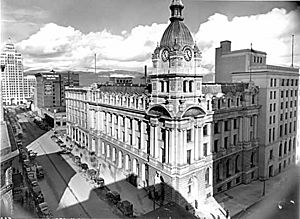
The Vancouver Art Gallery is in a beautiful old building from 1906. It used to be a courthouse. The Hotel Vancouver, opened in 1939, is also a famous building downtown with a copper roof. The Christ Church Cathedral, built in 1894, is another historic landmark.
There are also many modern buildings. These include the Harbour Centre, the Vancouver Law Courts (designed by Arthur Erickson), and the Vancouver Library Square (designed by Moshe Safdie). The library looks a bit like the Colosseum in Rome.
A very noticeable building is Canada Place. It has giant tent-like sails and was built for the 1986 World Exposition. It now includes part of the Vancouver Convention Centre and a cruise ship terminal.
Some older buildings in downtown Vancouver were once the tallest commercial buildings in the British Empire. The Marine Building from the 1920s is famous for its detailed decorations. Today, the tallest building in Vancouver is Living Shangri-La, which is 201 meters (659 feet) tall.
People and Cultures
| Vancouver | ||
|---|---|---|
| Year | Pop. | ±% |
| 1891 | 13,709 | — |
| 1901 | 26,133 | +90.6% |
| 1911 | 100,401 | +284.2% |
| 1921 | 117,217 | +16.7% |
| 1931 | 246,593 | +110.4% |
| 1941 | 275,353 | +11.7% |
| 1951 | 344,833 | +25.2% |
| 1956 | 365,844 | +6.1% |
| 1961 | 384,522 | +5.1% |
| 1966 | 410,375 | +6.7% |
| 1971 | 426,256 | +3.9% |
| 1976 | 410,188 | −3.8% |
| 1981 | 414,281 | +1.0% |
| 1986 | 431,147 | +4.1% |
| 1991 | 471,644 | +9.4% |
| 1996 | 514,008 | +9.0% |
| 2001 | 545,671 | +6.2% |
| 2006 | 578,041 | +5.9% |
| 2011 | 603,502 | +4.4% |
| 2016 | 631,486 | +4.6% |
| 2021 | 662,248 | +4.9% |
| Source: Statistics Canada | ||
In 2021, Vancouver's population was 662,248. This makes it the eighth-largest city in Canada. The wider Metro Vancouver area has 2,642,825 people. About 75% of people in Metro Vancouver live outside the city of Vancouver itself.
Many people in Vancouver were born outside Canada. In 2021, about 42.2% of the population were immigrants. The top countries of origin include China, the Philippines, and Hong Kong.
Diverse Communities
Pan-ethnic breakdown of Vancouver from the 2021 census European (43.22%) East Asian (29.26%) Southeast Asian (9.1%) South Asian (6.9%) Latin American (2.78%) Middle Eastern (2.44%) Indigenous (2.25%) African (1.31%) Other (2.74%)
Vancouver is known as a "city of neighborhoods." Each area has its own feel and mix of people. Historically, people of English, Scottish, and Irish backgrounds were the largest groups.
Today, people of Chinese heritage are the largest visible ethnic group. Vancouver has a large Chinese-speaking community. Other neighborhoods have distinct ethnic areas like Chinatown, Punjabi Market, Little Italy, and Greektown.
Since the 1980s, many immigrants have come to Vancouver. This has made the city very diverse in its cultures and languages. About 49% of residents do not speak English as their first language.
Vancouver also has a large LGBT community. The Davie Village in the West End is a well-known area for the gay community. The city hosts one of Canada's biggest annual pride parades.
Languages Spoken
In 2021, about 94.1% of Vancouver's population knew the English language. Other common languages include Cantonese (14.9%), Mandarin (11.5%), and French (9.4%).
Beliefs and Religions
| Religious group | 2021 | 2011 | 2001 | 1991 | ||||
|---|---|---|---|---|---|---|---|---|
| Pop. | % | Pop. | % | Pop. | % | Pop. | % | |
| Christian | 194,365 | 29.88% | 213,855 | 36.23% | 229,015 | 42.44% | 238,460 | 51.25% |
| Buddhist | 26,245 | 4.04% | 33,450 | 5.67% | 37,140 | 6.88% | 20,595 | 4.43% |
| Muslim | 17,910 | 2.75% | 13,255 | 2.25% | 9,345 | 1.73% | 5,785 | 1.24% |
| Sikh | 16,535 | 2.54% | 16,815 | 2.85% | 15,200 | 2.82% | 12,935 | 2.78% |
| Hindu | 12,585 | 1.94% | 8,220 | 1.39% | 7,670 | 1.42% | 6,745 | 1.45% |
| Jewish | 11,675 | 1.8% | 10,350 | 1.75% | 9,620 | 1.78% | 8,675 | 1.86% |
| Other religion | 8,145 | 1.25% | 5,820 | 0.99% | 3,705 | 0.69% | 3,190 | 0.69% |
| Irreligious | 362,925 | 55.8% | 288,435 | 48.87% | 227,925 | 42.24% | 168,910 | 36.3% |
| Total responses | 650,380 | 98.21% | 590,205 | 97.8% | 539,630 | 98.89% | 465,300 | 98.61% |
Many people in British Columbia, including Vancouver, do not identify with a specific religion. However, Vancouver's Asian population is notable for its Christian faith. Other religious groups in Vancouver include Buddhists, Muslims, Sikhs, Hindus, and Jews.
Vancouver's Economy
Vancouver is one of Canada's biggest industrial centers. Its location on the Pacific Rim and at the end of Canada's main highway and rail routes makes it important for trade. Port Metro Vancouver is Canada's largest port. It handles over $172 billion in trade each year with more than 160 different countries.
Vancouver is also a hub for many industries. These include software development, biotechnology, aerospace, video game development, and film and television production. Vancouver is the third-largest film and TV production center in North America, after Los Angeles and New York City. It supports about 20,000 jobs. Many well-known lifestyle brands like Lululemon and Arc'teryx started here.
Vancouver's beautiful location makes it a popular place for tourists. Over 10.3 million people visited Vancouver in 2017. Tourism brings in about $4.8 billion to the Metro Vancouver economy and supports over 70,000 jobs. Visitors come to see the city's gardens, Stanley Park, and the surrounding mountains, ocean, and forests. Many people also start their cruise ship vacations to Alaska from Vancouver.
Housing in Vancouver is very expensive. In 2012, it was ranked as the second-most unaffordable city in the world. The city is trying different ways to make housing more affordable.
Learning in Vancouver
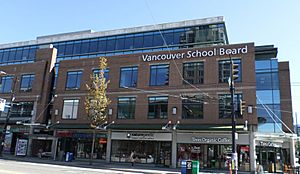
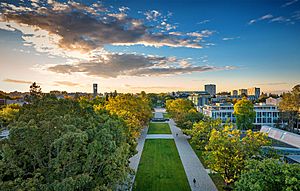
The Vancouver School Board teaches over 110,000 students. It's the second-largest school district in British Columbia. The district runs many elementary and secondary schools. It also has schools for adults, French immersion, and a Mandarin bilingual school. There are also many private schools in the city.
There are five public universities in the Greater Vancouver area. The biggest and most well-known are the University of British Columbia (UBC) and Simon Fraser University (SFU). UBC is often ranked among the top universities in the world. SFU is consistently ranked as a top comprehensive university in Canada. Both universities have campuses in Downtown Vancouver.
Other public colleges and institutes offer different types of education. These include Vancouver Community College, Langara College, and the British Columbia Institute of Technology. Many international students come to Vancouver to study. In 2008–2009, 53% of students in the Vancouver School Board spoke a language other than English at home.
Arts and Fun
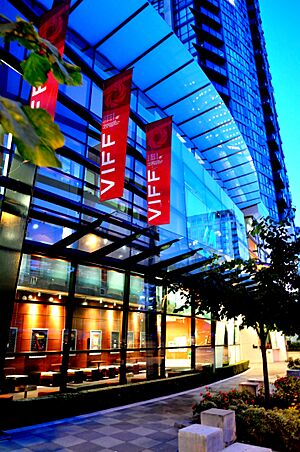
Theatre, Dance, Film, and TV
Live Shows
Vancouver has many theatre companies. The Arts Club Theatre Company and Bard on the Beach are very popular. Smaller groups also perform throughout the year. Theatre Under the Stars puts on shows in Stanley Park during the summer. The city also hosts annual festivals like the PuSh International Performing Arts Festival.
Dance Performances
Ballet BC is Vancouver's main ballet company. They perform at the Queen Elizabeth Theatre. The Scotiabank Dance Centre is a place where dancers can practice and perform.
Movies and Festivals
The Vancouver International Film Festival happens every September. It shows over 350 films and is one of North America's biggest film festivals. The VIFF Centre shows independent films all year.
Movies Filmed in Vancouver
Vancouver is a major place for filming movies, earning it the nickname "Hollywood North". Many movies have been filmed here, sometimes pretending to be other cities. But some movies are actually set in Vancouver, like Intersection and They Wait.
TV Shows Made Here
Many TV shows have been filmed in Vancouver. Some are even set in the city, like Cold Squad and Da Vinci's Inquest. Other popular shows filmed here include The 100, Arrow, The Flash, The Good Doctor, Riverdale, and The X-Files.
Libraries and Museums

The Vancouver Public Library has a main branch at Library Square. It holds 1.5 million books. In total, the library has 22 branches with 2.25 million books.
The Vancouver Art Gallery has a collection of nearly 10,000 art pieces. The Museum of Anthropology at UBC has a large collection of First Nations cultural items from the Pacific Northwest Coast. Science World at False Creek is an interactive museum where you can learn about science.
Art Around the City
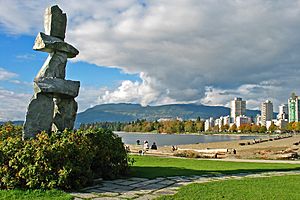
Vancouver has many Artist Run Centres. You can also see many pieces of public art throughout the city, like the Inukshuk sculpture at English Bay.
Music and Nightlife
Vancouver has a lively music scene. The Vancouver Symphony Orchestra is the city's professional orchestra. The Vancouver Opera is a major opera company. Many famous musicians and bands started in Vancouver, including Bryan Adams, Sarah McLachlan, and Michael Bublé.
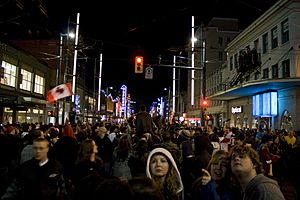
Big concerts are held at places like Rogers Arena and BC Place Stadium. Smaller shows happen at the Commodore Ballroom and Orpheum Theatre. Vancouver also hosts music festivals like the Vancouver Folk Music Festival and the Vancouver International Jazz Festival.
Vancouver has a fun nightlife. The Granville Entertainment District has many bars and nightclubs. Gastown and the Davie Village are also popular areas for nightlife.
Media in Vancouver
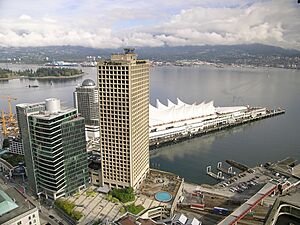
Vancouver is a big center for making films and TV shows. It's called Hollywood North because so much production happens here. In 2021, $3.6 billion was spent on film production in Vancouver.
The city has several newspapers. The two main English daily newspapers are The Vancouver Sun and The Province. There are also Chinese-language newspapers for the city's large Cantonese and Mandarin-speaking populations.
Local TV stations include CBC, Citytv, CTV, and Global BC. There are also stations that produce news in different languages for multicultural groups.
Getting Around Vancouver
Vancouver's streetcar system started in 1890. Over time, it changed to electric trolleys and buses. Today, Vancouver has the second-largest trolleybus fleet in North America.
The city has chosen not to build many freeways. The only major freeway within the city is Highway 1. Even though the population has grown, fewer cars are driving into downtown. People are choosing to live closer to work or use public transport and bikes.
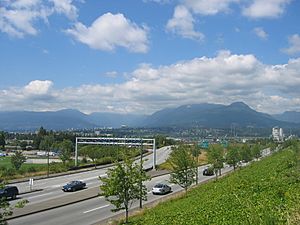
TransLink manages public transportation in Metro Vancouver. This includes buses, the SeaBus ferry, and the SkyTrain automated rapid transit system. Vancouver's SkyTrain has three lines and 53 stations.

The Canada Line, which opened in 2009, connects Vancouver International Airport and Richmond to the SkyTrain system. There are also plans to extend the SkyTrain further.
Other ways to travel include inter-city passenger trains from Pacific Central Station. Small ferries operate in False Creek. Vancouver also has a great network of bicycle lanes, making cycling a popular way to get around.
Vancouver International Airport (YVR) is located in Richmond, just south of Vancouver. It's Canada's second-busiest airport. HeliJet and float plane companies also offer flights from Vancouver harbour. Two BC Ferry terminals connect the city to Vancouver Island and other areas.
Sports and Fun Activities
Vancouver's mild climate and location near the ocean and mountains make it a great place for outdoor activities. The city has over 1,298 hectares (3,200 acres) of parks. Stanley Park is the largest at 404 hectares (1,000 acres). Vancouver has many beaches along its coastline, perfect for water sports.
Just a short drive from downtown are the North Shore Mountains. Here you'll find three ski areas: Cypress Mountain, Grouse Mountain, and Mount Seymour. These mountains are also popular for mountain biking and hiking. The Capilano River, Lynn Creek, and Seymour River offer opportunities for hiking and swimming.
Vancouver hosts several running races, like the Vancouver Sun Run and the Vancouver Marathon. The Grouse Grind is a challenging 2.9 km (1.8 mi) climb up Grouse Mountain.

Vancouver also hosts cycling races, including the Gastown Grand Prix. The British Columbia Derby is a horse race held at Hastings Racecourse.
In 2010, Vancouver, along with Whistler and Richmond, hosted the 2010 Winter Olympics and 2010 Winter Paralympics. In 2015, Vancouver was one of the host cities for the 2015 FIFA Women's World Cup and hosted the Final game. Vancouver will also host matches for the 2026 FIFA World Cup.
Vancouver is known as Canada's fittest major city, with a low obesity rate.
Professional Sports Teams
| Professional team | League | Sport | Venue | Established | Championships |
|---|---|---|---|---|---|
| BC Lions | Canadian Football League (CFL) | Football | BC Place | 1954 | 6 |
| Vancouver Canucks | National Hockey League (NHL) | Ice hockey | Rogers Arena | 1970 (1945: PCHL) |
0 (6 in previous leagues) |
| Vancouver Canadians | Northwest League (NWL) |
Baseball | Nat Bailey Stadium | 2000 | 4 |
| Vancouver Whitecaps FC | Major League Soccer (MLS) | Soccer | BC Place | 2009 (1974: NASL) |
0 (7 in previous leagues) |
| BC Bears | Canadian Rugby Championship (CRC) | Rugby Union | Thunderbird Stadium | 2009 | 2 |
| Vancouver Warriors | National Lacrosse League (NLL) | Box Lacrosse | Rogers Arena | 2014 | 0 (1 as the Washington Stealth) |
| Vancouver Titans | Overwatch League | Overwatch | Blizzard Arena | 2018 | 1 (Stage 1 Champions) |
Vancouver is home to several professional sports teams. These include the BC Lions (football), Vancouver Canucks (ice hockey), Vancouver Canadians (baseball), and Vancouver Whitecaps FC (soccer). The Vancouver Grizzlies (basketball) used to play here but moved to Memphis in 2001.
Being a Green City
Vancouver is part of Metro Vancouver, which helps provide sustainable services. The city's electricity comes mostly from clean hydroelectric power. Vancouver is considered the greenest city in Canada.
The Greenest City action plan aims to make Vancouver the greenest city in the world by 2020. This plan includes reducing waste. In 2018, the city passed a plan to reduce single-use items like plastic straws and foam food packaging.
Sister Cities
Vancouver has "sister city" relationships with other cities around the world. These special partnerships help with cultural, social, and economic benefits.
| Country | Municipality | Year |
|---|---|---|
| Ukraine | Odesa | 1944 |
| Japan | Yokohama | 1965 |
| Scotland | Edinburgh | 1978 |
| China | Guangzhou | 1985 |
| United States | Los Angeles | 1986 |
Images for kids
See also
 In Spanish: Vancouver para niños
In Spanish: Vancouver para niños
 | George Robert Carruthers |
 | Patricia Bath |
 | Jan Ernst Matzeliger |
 | Alexander Miles |


